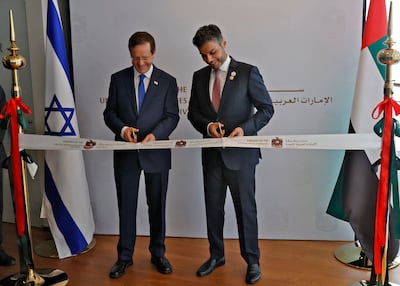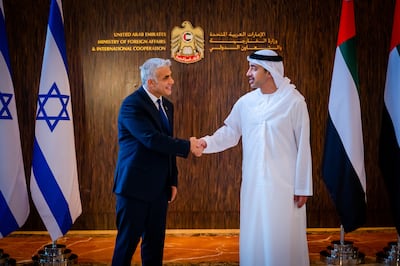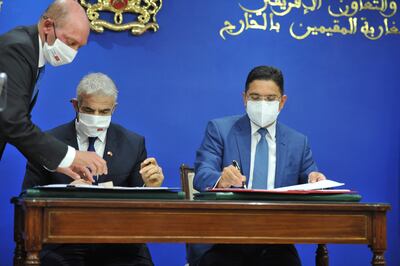The historic resolution made by the UAE leadership to formally establish ties with Israel a year ago was seen as one of the most significant breakthroughs in the Middle East peace process that had stalled for years.
Under the agreement, known as the Abraham Accords that former US president Donald Trump helped to broker, Israel agreed to suspend its planned annexation of parts of the occupied West Bank.
Bahrain later joined the UAE in officially establishing ties with Israel.
In mid September 2020, senior representatives of the UAE, Bahrain, the US and Israel signed the Abraham Accords at the White House in Washington.
Senior UAE ministers said the agreement would not change their firm stance towards the peace process. The UAE remains committed to the Arab plan of a negotiated two-state solution, with East Jerusalem as the capital of an independent Palestinian state.
As part of the deal, Israel also reached an agreement with Sudan and Morocco.
What has happened since August?
Since last August, both the UAE and Israel have exchanged ambassadors, opened embassies and established co-operation in areas such as health care, innovation, aviation, environment and energy.
Last month, the UAE opened its embassy in the stock exchange building in Tel Aviv.

“This embassy will serve not just as a home for diplomats but a base for our task to continue to build on our new partnership,” said the UAE's ambassador to Israel, Mohamed Al Khaja, after raising the UAE flag.
Its aim is “to seek dialogue, not disputes, to build a new paradigm of peace and to provide a model for a new collaborative approach to conflict resolution in the Middle East”.
In June, Israeli Foreign Minister Yair Lapid opened his country’s embassy in Abu Dhabi and a consulate in Dubai.
Mr Lapid’s visit to the UAE was the first by a senior Israeli minister since relations were established.
“We are standing here today because we chose peace over war,” Mr Lapid said during the opening ceremony in Abu Dhabi.

“Israel wants peace with its neighbours, with all its neighbours – we aren't going anywhere. The Middle East is our home, we're here to stay,” he said.
In the year since the Accords were signed, trade has reached more than Dh2.48 billion ($675.2 million) between the two states.
The agreement between the UAE, Israel and the US established the Abraham Fund, and through this fund the US International Development Finance Corporation, the UAE and Israel committed to mobilising more than $3bn in private sector-led investment and development initiatives to promote regional economic co-operation in the Middle East and the wider region.
The UAE’s Minister of State for Food Security, Mariam Al Mheiri, signed an agreement to enhance co-operation in food production, supply chains and research during a visit to Israel in June.
Israel’s Foreign Ministry said nearly 200,000 Israelis have visited the UAE and 12 agreements have been signed during the past 10 months.
Morocco and Sudan agreements
Mr Lapid landed in Morocco on Wednesday in what was the first visit by Israel’s foreign minister since the two countries agreed to strengthen relations.
They agreed in December to resume diplomatic ties and relaunch direct flights under a deal brokered by Mr Trump.

Last month, non-stop commercial flights from Tel Aviv to Marrakesh were launched by Israeli airlines, but due to an increase in coronavirus cases in both nations the intention to increase tourism is on hold.
Sudan last year joined the agreement to normalise ties with Israel, followed by a move by Mr Trump to drop the country from a US government list of countries promoting and harbouring terrorists in December.
Israel and Sudan plan to develop economic and trade links, with an initial focus on agriculture.


